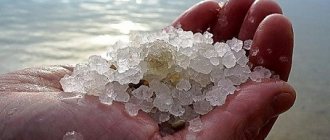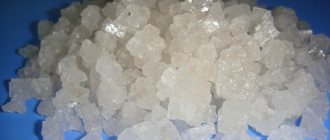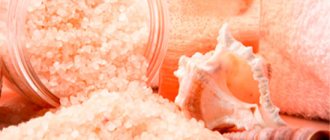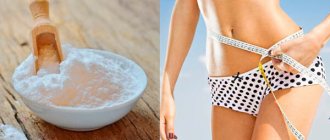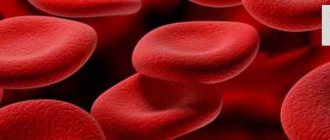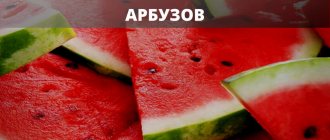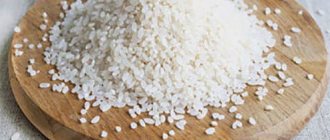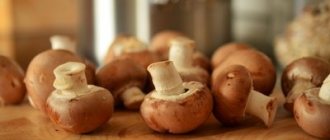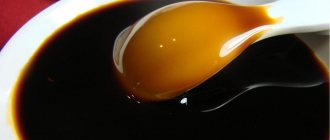13725
It is generally accepted that salt is especially harmful when losing weight. Many nutritionists, specialists and people who are losing weight themselves recommend giving up salt altogether if the goal is to lose weight and get rid of excess weight.
Today we will try to figure out whether it is possible to eat salt while losing weight. In addition, it is of great importance how dangerous the salt-free diet itself is. It is no coincidence that people have been using salt for centuries and supplementing their dishes with it. Our bodies are already accustomed to salt; it also contains useful substances.
Features of salt, effects on the body
Salt is a naturally occurring mineral. And it has quite a lot of valuable properties. For example, sea salt is widely used in various cosmetic procedures. The mineral is effective in processing food products so that they do not spoil longer and are reliably protected from a variety of bacteria. At the same time, the taste of dishes that are supplemented with salt becomes significantly better and brighter.
It is known that salt allows you to destroy harmful microorganisms, as well as bacteria in the gastrointestinal tract. Ultimately, the level of beneficial bacteria also increases.
Unfortunately, when using table salt, it is not possible to immediately remove all these bacteria, but they clog the blood vessels. Many nutritionists believe that sea salt is the best choice.
How much do they eat?
During the experiment, the animals were able to eat to their heart's content, and it turned out that normal mice on a salt diet absorbed 40–50% more food than control animals and mutants in which salt intake did not affect appetite (Fig. 3). Obviously, obesity in mice develops due to hyperphagia, in other words, due to gluttony. One of the hormones that regulates appetite is leptin. This peptide is synthesized in adipose tissue cells, and in salted wild-type mice, the level of leptin mRNA in adipocytes is very high, and the content of the hormone in the blood is several times higher than in animals of other groups. At this concentration of leptin, mice should not feel hungry, but they eat for two. Apparently they have lost sensitivity to leptin.
To test this, mice were given leptin injections: one at 12 weeks after starting the salt diet, when metabolic syndrome had not yet developed, and another at 25 weeks. In control animals and salted mutants, leptin injections significantly reduced appetite for seven hours after the injection. The mice in the experimental group did not react to the hormone and continued to eat. Leptin acts on the hypothalamus. Its cells contain the protein STAT3, and the level of phosphorylation of this protein can determine the sensitivity of the hypothalamus to leptin. A salt diet and the metabolism of endogenous fructose reduce this sensitivity. Researchers emphasize that leptin resistance develops before other signs of metabolic syndrome.
American scientists have proven that very little “oversaltness” of blood can cause obesity in mice. However, people get their excess salt not from drinking, but from food. To bring the experimental conditions closer to human ones, the researchers added salt to the food.
Normal mice and KNK mutants were put on a fatty and sweet diet. It contained either 0.25% salt, which corresponds to the upper recommended limit of consumption - 6.8 g for 2500 g of food per day, or 0.1% (analogous to 3 g of salt per day). The animals could drink as much as they wanted. All the mice gained weight from the fat and sugar, but the animals that received more salt had higher leptin concentrations, greater appetite, and maximum weight gain. Their obesity was accompanied by the synthesis of endogenous fructose. In the mutants, the amount of salt did not affect appetite or weight gain.
Using salt: pros and cons
Now we will focus on some of the most important disadvantages, as well as advantages, of using salt. Let's start with the negative factors.
Flaws
In the process of losing weight, salt does have a negative effect on the weight loss process. Of course, if you take into account only the volume of calories consumed, carbohydrates and fats, salt will not play a role here. However, another factor is of great importance. The fact is that when losing weight, removing excess moisture from the body plays a huge role. It is necessary to relieve swelling: this allows you to get rid of extra pounds, as well as eliminate excessive volumes. Accordingly, salt has a negative effect here, since it helps retain moisture in the body.
Many doctors generally have a negative attitude towards the use of salt in any form, regardless of the type (sea, table). Thus, for diseases of the kidneys, cardiovascular system, or high blood pressure, it is recommended to completely exclude salt from the menu. Thus, it has long been known that salt has an effect on increasing blood pressure.
A wide range of diets involve avoiding salt intake. Such weight loss techniques are focused on weight loss by removing fluid from the body. It is important to understand that when you return to using salt, your weight may also return. The body will begin to gain moisture again, and swelling will appear.
Be sure to read: Losing weight with kefir fasting day
With excessive salt consumption and a love of salty foods, an imbalance of minerals in the body can be observed. This also provokes an increase in blood pressure, since vasoconstriction begins to limit the accumulation of toxic compounds in the blood.
Advantages
Salt plays an important role in the human body because it regulates the level of water content. There are several other essential features as well.
- The use of salt provides rapid relief from so-called physiological stress. It is this that allows the brain to more actively produce histamines. So, if a person is struck by an asthma attack, he can be saved by salt. It is recommended to drink a glass of water and put a small pinch of salt on your tongue. Its effect can be compared with inhalation, while it completely lacks toxic compounds. But it is recommended to drink clean water without gas first.
- Kidneys also need salt, albeit in moderation. It is this that ensures a decrease in the overall level of acidity, as well as the timely removal of harmful acids during urination. As a rule, people significantly acidify the body by eating sweets, confectionery, and all kinds of unhealthy foods. It is thanks to the positive effects of salt that it is possible to restore the acid-base balance at the cellular level, otherwise the body expects a sharp jump in acidity.
- Brain cells can also be cleansed of excess acidity thanks to the positive effects of salt! That is why many experts note: moderate consumption of salty foods helps prevent the further development of Alzheimer's disease. If you do not want to face this serious illness in old age, you need to give up harmful salt-free diets, and also not take strong diuretics for a long time. Always try to maintain a normal level of water content in the body: you can get rid of edema, but not by extreme methods.
- It’s interesting, but there are also observations: salty foods help a person relieve stress and restore a good emotional state. This is true: thanks to such dishes, you can quickly get rid of depression.
- It is known that nutrition based on protein products of marine origin, supplemented with sea salt, is indeed more healthy. It is even believed that such a diet can increase life expectancy. It is useful, rejuvenates and heals the body. If you really want to take care of your health and the general condition of your body, you should definitely include salty foods in your menu, but only use a stone or sea mineral, and not a cooked product. After all, during purification it turns into almost pure sodium, and the processing is carried out using a chemical method.
- Salty food in combination with water works in the human body as a natural complex antioxidant. This complex ensures rapid removal of toxins, while a variety of valuable amino acids are perfectly preserved. There is such an element - tryptophan. It is also better preserved under the influence of the mineral, and then provides invaluable assistance to the brain: as a result, melatonin and serotonin, as well as tryptamine, are actively produced there. All these components are active antidepressants. With them, the mood will be better, the emotional background will become stable and favorable.
Be sure to read: Detailed description of diet for weight loss
Some believe that frequent diets with a lack of magnesium salts can even provoke cancer. Such data were obtained from experiments with experimental animals.
How to understand that there is an excess of salt?
Since too much salt is guaranteed to lead to serious health problems, it is important to understand how to recognize too much sodium in the body. “It is extremely difficult to accurately estimate the amount of sodium consumed daily, but sodium excretion (removal of waste products from the body, mainly through the kidneys) in daily urine is a method that is considered the “gold” standard for determining the salt consumed per day,” says Narine Samsonova.
There are a number of external signs that indicate an excess of sodium in the body. “Hypernatremia (excess sodium in the body) can be caused by increased sodium intake or decreased excretion due to heart failure (HF), chronic kidney disease (CKD), etc.
Clinical manifestations of hypernatremia can be: peripheral edema, shortness of breath, pulmonary edema, venous congestion, arterial hypertension (high blood pressure), excess body weight, effusion (excess fluid in one of the body cavities),” notes the specialist.
So, if you want your body to work like a clock, you should undergo an examination and consult with a specialist about how much salt you can afford without harm to the body.
Consumption rate
Let's talk about the recommended amount of consumption. It is generally accepted that it is enough to consume no more than four grams of salt throughout the day. At the same time, people who suffer from high blood pressure should reduce the norm by four times.
Separately, it is worth noting those periods and situations in which a person sweats more. Along with sweat comes the loss of salts, amino acids, as well as vitamins and various valuable minerals. It is recommended to include more unrefined salt in your diet to compensate for the lack of beneficial microelements. Unfortunately, there are none in the kitchen, so it does more harm than good.
Consuming salt when following a diet is still necessary, at least in minimal quantities. If a person decides to follow a salt-free diet, it should not be long-term. Salty foods are necessary for the proper functioning of the human body. It is important to maintain the correct balance of sodium and potassium. This is also necessary for good functioning of the cardiovascular system.
Summarize
If you carefully weigh the pros and cons, then saline liquid will be preferable. And there are the following reasons for this:
- Feeling full. Vapers use their electronic cigarette so that the body receives the required dose of the alkaloid in a short period of time and is completely satisfied with it. It is instantly absorbed and the desired “bomb” effect is achieved after the third puff.
- A small amount of liquid is required. Since the liquid with salts is thicker, the vaporizer consumes significantly less during smoking. In approximately 1 day, only 2 mg of uvaper is consumed. What is considered profitable, economical.
- No adverse effects on human health because the additives are eliminated at an incredible rate.
- One of the most important advantages is the absence of burning and irritation in the mouth. Thanks to this, you can truly enjoy vaping.
It is imperative to keep in mind that the salt alkaloid can cause serious harm if you do not know how to vaporize it correctly. When vaping, you need to monitor your feelings and strictly follow all recommendations. It is also advisable to remember that this new product has just recently appeared, and scientific research has not been conducted on its prolonged effects on human organs.
Contraindications, side effects
It is necessary to consider lists of contraindications, as well as side effects that may occur when giving up salty foods even for a short period of time. Under the following conditions, such diets are prohibited:
- Children under 18 years old, elderly people;
- For kidney and liver diseases;
- For diseases of the cardiovascular system;
- Hypertension;
- Excessive physical activity;
- Malfunctions of the endocrine system, thyroid disease.
During pregnancy and lactation, it is also recommended to abandon such a limited menu. Professional athletes cannot diet in this way, since they experience great physical stress.
Here are the possible side effects of salt-free diets:
- Weakening of bones due to lack of sodium chloride;
- General malaise, fatigue;
- Muscle weakness;
- Lack of appetite;
- Nausea;
- Failures in metabolic processes;
- Pressure drop;
- Digestive disorders.
Be sure to read: Causes of cellulite in thin girls
Store-bought products usually contain salt, but if you prefer more natural foods and include a maximum of fresh vegetables and fruits in your diet, the likelihood of a lack of salt increases.
Maintaining a salt-free diet correctly
There are several rules that will help you get the maximum benefit from your nutritional method. First of all, remember that this regime must be limited in duration. For example, keep a diet for a couple of weeks. This is quite enough to achieve the desired result, but you will not have time to harm the body or provoke metabolic failures.
Here are the rules.
- Food should be taken in small portions, approximately five times throughout the day.
- You can add a little seasoning and oil, but only to already prepared dishes.
- Avoid smoked, marinated and fried foods. It’s better to bake in the oven, boil, steam.
- You should completely avoid salty foods during the diet.
- In the summer, this diet is not suitable, since sweat production will be increased, and the body will already lose too many valuable minerals.
- Physical activity should be moderate.
- It is imperative to adhere to the correct drinking regime. It is recommended to drink about two liters of purified water without gas per day.
- You should eat your last meal three hours before going to bed.
- They exit the diet smoothly, gradually increasing the volume of familiar foods on the menu, otherwise the lost kilograms and volumes will quickly return.
You can successfully replace salt with some products. For example, sea kale is ideal. In addition, seasonings with spices, dried herbs, citrus fruits and even some dairy products are good alternatives. It is believed that among salt-free diets, the Chinese one is the most effective. However, it is quite strict, so it is not easy to comply with it.
